|
|
|
Sort Order |
|
|
|
Items / Page
|
|
|
|
|
|
|
| Srl | Item |
| 1 |
ID:
120366
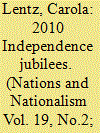

|
|
|
|
|
| Publication |
2013.
|
| Summary/Abstract |
In 2010, as many as seventeen African states celebrated their independence jubilees. The debates surrounding the organisation of these celebrations, and the imagery and performances they employed, reflect the fault lines with which African nation-building has to contend, such as competing political orientations as well as religious, regional and ethnic diversity. The celebrations represented constitutive and cathartic moments of nation-building, aiming to enhance citizens' emotional attachments to the country and inviting to remember, re-enact and re-redefine national history. They became a forum of debate about what should constitute the norms and values that make-up national identity and, in the interstices of official ceremonies, provided space for the articulation of new demands for public recognition. A study of the independence celebrations thus allows us to explore contested processes of nation-building and images of nationhood and to study the role of ritual and performance in the (re)production of nations.
|
|
|
|
|
|
|
|
|
|
|
|
|
|
|
|
| 2 |
ID:
120373
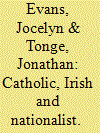

|
|
|
|
|
| Publication |
2013.
|
| Summary/Abstract |
Irish national identity, political nationalism and Catholicism are the defining characteristics of the minority community in Northern Ireland. These identifiable ethno-national and ethno-religious characteristics have been the basis of communal solidarity that has transcended increasing socio-economic heterogeneity within that community. Both of the Nationalist political parties in Northern Ireland, Sinn Féin and the Social Democratic and Labour Party (SDLP), draw their support almost exclusively from their community of origin. What is not known, however, is the relative importance of Irishness, Catholicism and Nationalism in shaping support for either party. Which of these ethnic identifiers is of greatest salience in identifying support for Sinn Féin or the SDLP? Drawing upon recent election survey evidence, this article attempts to rectify this information deficit, highlighting the weighting of components of ethnicity in determining intra-bloc political allegiances.
|
|
|
|
|
|
|
|
|
|
|
|
|
|
|
|
| 3 |
ID:
120365
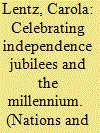

|
|
|
| 4 |
ID:
120371


|
|
|
|
|
| Publication |
2013.
|
| Summary/Abstract |
This article argues against the dominant Anglophone and Francophone interpretation of Fichte, which reads him as advancing either a form of ethnic or cultural nationalism. It claims that what is missing from the current reception of Fichte is the essentially philosophical and cosmopolitan character of his nationalism - the fact that the Addresses to the German Nation uses non-empirical and cosmopolitical concepts to develop and articulate its nationalistic viewpoint. It therefore claims that the notion of a national philosophical idiom that the Addresses present, far from being a screen for its nationalism, is its driving engine. It does this by considering the problems of translating the German locution ist unsers Geschlechts. Consequently, it is claimed that the cosmo-nationalism of Fichte is not reducible to a set of claims regarding ethnicity or even the empirical world, even if a discourse on the organismic, on what counts as life, irreducibly haunts the Addresses.
|
|
|
|
|
|
|
|
|
|
|
|
|
|
|
|
| 5 |
ID:
120370
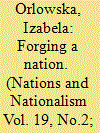

|
|
|
|
|
| Publication |
2013.
|
| Summary/Abstract |
Due to a different calendric system, Ethiopia celebrated the turn of the millennium in September 2007. This paper investigates how Ethiopia's coalition government, associated by many Ethiopians with minority rule, set up and mobilised a year-long millennium project to propose new idioms of nationhood redefining Ethiopia's identity to deal with the challenges of ethnic federalism and to accommodate its multiethnic society. I argue that the millennium celebration sought to find a solution to the divisive effects of the politics of 'difference' derived from a policy of ethnic federalism, and to the existing outdated metaphors of nationhood rooted in Semitic culture and Orthodox Christianity. It proposed more suitable idioms of common identity based on the idea of 'unity in diversity'. This paper contributes to our better understanding of the role of symbolism, commemorative events and appropriation of the 'sites of memory' in the complex process of the transition of multiethnic societies into nation states.
|
|
|
|
|
|
|
|
|
|
|
|
|
|
|
|
| 6 |
ID:
120369


|
|
|
|
|
| Publication |
2013.
|
| Summary/Abstract |
This article explores competing histories of independence in Côte d'Ivoire. The 2010 commemoration of fifty years of independence led to competing histories about how and if the nation achieved independence in 1960. The postelectoral crisis of 2010-2011 that followed soon afterwards has been interpreted by supporters of the outgoing president Laurent Gbagbo as an attempt by France and the international community to re-colonise Côte d'Ivoire. The article asks how different versions of this history are connected to different political projects and how they have changed through time. The article will analyse these processes of meaning-making in a historiology of Ivorian independence, thus contributing to constructivist accounts of nationhood, collective memory and historiography. The paper thus argues that different media of recalling the past in the present, such as commemoration and historiography, should be studied in a complementary manner to understand how (joint) remembering and forgetting are tools and mirrors of nations at work.
|
|
|
|
|
|
|
|
|
|
|
|
|
|
|
|
| 7 |
ID:
120368
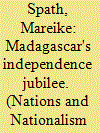

|
|
|
|
|
| Publication |
2013.
|
| Summary/Abstract |
The fiftieth anniversary of Madagascar's independence in 2010 took place in the midst of political crisis. The transitory government staged large public parties to mark the Jubilee. Despite a public discussion about legitimacy and justification of this fact, the national holiday was lavishly celebrated. In Madagascar, Independence Day is also an important family event and emphasis was put on private celebrations including family feasts and reunions. As a result, it enhanced the participants' emotional attachment to their personal and local face-to-face milieu. This article asks how the golden jubilee was celebrated against a backdrop of political illegitimacy. I contrast official state-led initiatives and individual agency in the private sphere and discuss how the national holiday has been appropriated and reinterpreted by the population as a family and community holiday. This article is based on qualitative ethnographical fieldwork in Antananarivo before, during and after the peak of the independence jubilee.
|
|
|
|
|
|
|
|
|
|
|
|
|
|
|
|
| 8 |
ID:
120364
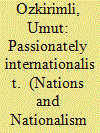

|
|
|
|
|
| Publication |
2013.
|
| Summary/Abstract |
The aim of this academic obituary is to briefly consider Fred Halliday's (1946-2010) contribution to nationalism studies. The article will first discuss Halliday's understanding of nationalism, which he defines as a set of ideas that asserts that the world is divided into distinct peoples with a particular history and various entitlements, and his position in the theoretical debate on nationalism. It will then focus on Halliday's combat with the ethical doctrine of nationalism, more specifically the tension between the moral claims of the latter and what he loosely terms Enlightenment principles. The article will conclude by a brief discussion of Halliday's political commitments and his internationalism.
|
|
|
|
|
|
|
|
|
|
|
|
|
|
|
|
| 9 |
ID:
120367
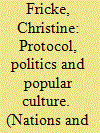

|
|
|
|
|
| Publication |
2013.
|
| Summary/Abstract |
National days are powerful moments of commemoration that aim at renewing the citizens' bonds to the nation and the state. In order to be successful, public rituals need to draw large audiences, and their ceremonial design therefore has to be adapted to suit the masses, employing elements of popular culture and everyday forms of nationhood. Despite drawing its significance from the declaration of independence in 1960, however, Gabon's independence jubilee was less concerned with history and commemoration than with celebrating the state and the nation in the present. The ceremonial design of Gabon's jubilee featured intensive preparations, official ceremonies, popular festivities and symbolic politics. In this article, I look at why history and commemoration played such an unimportant role during the celebrations and how Gabon's jubilee organisers included official as well as popular forms of nationhood to assure the population's participation.
|
|
|
|
|
|
|
|
|
|
|
|
|
|
|
|
| 10 |
ID:
120374


|
|
|
|
|
| Publication |
2013.
|
| Summary/Abstract |
The recent literature on Muslim organisations in the Turkish diaspora context is voluminous as is analysis of Kurdish and Alevi grassroots politics against the Turkish state. Yet nothing has been written on those whose political orientation is in line with the secularist-nationalist ideology of the Turkish Republic, that is, of Kemalists. As a contribution to this endeavour, this paper explores Kemalist actors' mobilisation in Australia. The paper argues that their current activism is related to a threatened economic privilege, a loss of cultural capital and a waning political dominance in the ongoing social life of Turkey.
|
|
|
|
|
|
|
|
|
|
|
|
|
|
|
|
| 11 |
ID:
120372
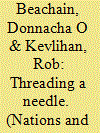

|
|
|
|
|
| Publication |
2013.
|
| Summary/Abstract |
This paper examines the state-building project in Kazakhstan since independence in 1991. It argues that both civic and ethno-nationalistic tendencies in state-building can be identified but that it is not any particular trajectory of nationalism in Kazakhstan that is of significance so much as the tensions between two very different trajectories. We argue that, at least to date, the government has succeeded in managing these tensions quite effectively both at the policy level and in its relations with different ethnic groups and neighbouring states. Whether Kazakhstan can continue to manage these tensions in the post-Nazarbayev era is one of the most significant questions facing the country.
|
|
|
|
|
|
|
|
|
|
|
|
|
|
|
|
|
|
|
|
|